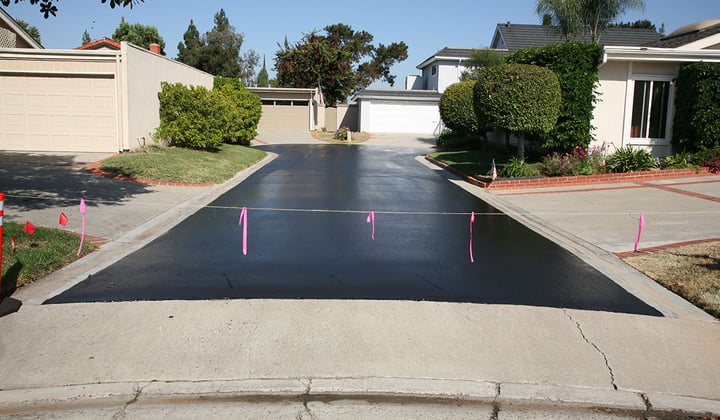Let loose the Potential: Regrading and Asphalt Sealing for Business Spaces
Let loose the Potential: Regrading and Asphalt Sealing for Business Spaces
Blog Article
Warm Mix Asphalt: A Sustainable Remedy for Pavement
Warm Mix Asphalt (HMA) has arised as a leading sustainable choice for pavement options, supplying a myriad of ecological benefits and cutting-edge technologies. Its capability to decrease and reuse products power usage provides a compelling situation for its fostering in roadway construction tasks. Furthermore, the long-term efficiency and sturdiness of HMA make it a preferred alternative for framework advancement. As the demand for environment-friendly construction practices expands, discovering the nuances of HMA's sustainability can supply valuable insights right into the future of sidewalk services.
Ecological Advantages of Warm Mix Asphalt

In Addition, Hot Mix Asphalt helps to reduce metropolitan warm island effects. Its dark shade absorbs sunlight, reducing the amount of warm mirrored back right into the ambience contrasted to lighter-colored pavements. This can reduce ambient temperatures in city locations, decreasing the demand for cooling and ultimately reducing energy consumption.
Additionally, Hot Mix Asphalt adds to enhanced stormwater management. Its permeable nature allows water to penetrate the pavement and recharge groundwater supplies, reducing overflow and the danger of flooding. These environmental benefits make Hot Mix Asphalt a sustainable selection for paving roadways and highways.
Energy Effectiveness in HMA Production
Is energy efficiency a crucial factor in the production of Warm Mix Asphalt (HMA)? Absolutely. Power plays a substantial role in the production of HMA, affecting both cost and ecological sustainability. One essential aspect of power performance in HMA production is the use of warm mix asphalt (WMA) innovations (hot mix asphalt). WMA enables for the mixing and placement of asphalt at lower temperature levels contrasted to standard warm mix asphalt, resulting in decreased energy consumption during manufacturing. This process not only reduces gas usage yet additionally lowers greenhouse gas emissions, making it an extra eco-friendly alternative.
Furthermore, innovations in plant innovations have actually caused more energy-efficient HMA production processes. Modern plants are designed with functions like recycled asphalt pavement (RAP) processing capabilities, effective heater systems, and improved insulation, all adding to energy cost savings. By maximizing power use in HMA production, the sector can lower its carbon impact while keeping top quality pavement products. Energy effectiveness is, consequently, an important consideration in making sure the sustainability of Hot Mix Asphalt production.
Recyclability of Warm Mix Asphalt
The recyclability of Hot Mix Asphalt (HMA) is a crucial element of its sustainability and long-term environmental influence. HMA is just one of one of the most recycled materials in the United States, with over 100 million bunches of redeemed asphalt sidewalk (RAP) being recycled annually in new pavement construction. Reusing HMA offers several ecological benefits, such as reducing the need for virgin materials, decreasing power intake during production, and lowering the quantity of waste sent out to garbage dumps.
The process of reusing HMA involves grating the existing sidewalk, squashing it right into smaller pieces, and mixing it with new accumulation and asphalt binder to develop a recycled mix. This recycled mix can frequently execute in addition to and even better than traditional HMA, while needing less raw products and creating reduced greenhouse gas discharges. By integrating RAP right into new sidewalk projects, road agencies can save natural deposits, lower prices, and reduce the environmental impact of road construction and maintenance activities. Overall, the recyclability of HMA plays a substantial function in advertising lasting techniques within the sidewalk sector.

Long-Term Performance of HMA
Asphalt pavements demonstrate toughness and strength over an extensive duration, reflecting the long-term performance of Warm Mix Asphalt (HMA) Furthermore, improvements in HMA technology, such as the usage of polymer-modified binders and cozy mix asphalt, have further enhanced the sturdiness and longevity of HMA pavements. By prioritizing quality building and construction and upkeep methods, HMA proceeds to confirm itself as a sustainable and cost-effective option for resilient pavement facilities.

HMA: Durability and Sustainability
Demonstrating both toughness and sustainability, Hot Mix Asphalt (HMA) has ended up being a foundation in the building and construction of long-lasting pavement infrastructures - angled parking. HMA's longevity stems from its capacity to endure hefty tons, harsh weather, and high website traffic quantities, making it a trusted option for roads, freeways, and airport terminal paths. The composition of HMA, which typically includes accumulations, binder, and filler, plays a critical function in improving its long life and resistance to tear and put on
Moreover, HMA's sustainability hinges on its recyclability and energy-efficient manufacturing procedure. The capability to recycle redeemed asphalt pavement (RAP) in dig this new HMA blends lowers the demand for virgin products and reduces the ecological influence content of pavement building and construction and upkeep. Furthermore, the power performance of generating HMA hinges on its reduced mixing temperatures contrasted to other sidewalk products, resulting in decreased energy consumption and greenhouse gas exhausts.
Final Thought
In verdict, warm mix asphalt (HMA) provides a lasting solution for sidewalk with its ecologically pleasant attributes. HMA's recyclability, power efficiency in production, and lasting resilience make it an environment-friendly selection for roadway building.
HMA is one of the most recycled materials in the United States, with over 100 million tons of recovered asphalt pavement (RAP) being reused yearly in brand-new pavement building.The process of reusing HMA involves milling the existing sidewalk, squashing it right into smaller sized pieces, and blending it with brand-new accumulation and asphalt binder to develop a recycled mix.Asphalt pavements demonstrate toughness and resilience over an extended duration, mirroring the long-lasting performance of Hot Mix Asphalt (HMA) Additionally, developments in HMA modern technology, such as the usage of polymer-modified binders and warm mix asphalt, have even more improved the sturdiness and long life of HMA pavements. The capability to reuse recovered asphalt sidewalk (RAP) in brand-new HMA go mixtures lowers the need for virgin materials and decreases the ecological impact of pavement building and construction and maintenance.
Report this page